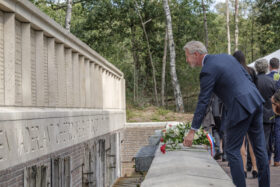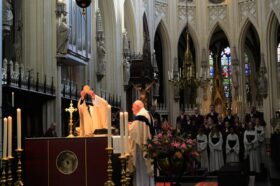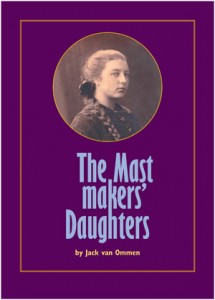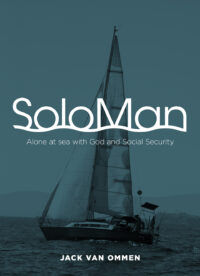In my previous blog I left off one of the main reasons for the Europe trip, the 75th anniversary of the evacuation of the inmates from the Nazi S.S. concentration camp Vught on September 6th 1944. The commemoration was held the first Sunday after I arrived on September the 8th. I attended the 65th anniversary in 2009, together with my twin brother. This time I represented my twin brother and my sister. There are still a few of the survivors alive but no longer physically able to attend. It was a beautiful sunny day. There was the usual silent procession, through the pine forest, from the camp to the nearby execution wall. This is where 142 male political prisoners were executed in the last three days before the September 6th transport to Germany. (Those of you who might have read the book or seen the movie “The Hiding Place” about the Dutch evangelist Corrie ten Boom, might have read one of several inaccuracies in the story, she reported this as 700 men executed on the last day prior to September 6th. The grand total for the existence of the camp, from 1943 until the closure, was 329 executions.) In my book “The Mastmakers’ Daughters” is the eye/ear witness story of Tiny Boosman who was with these men in the bunker in their last hour before their execution. She, with a few other women prisoners communicated through the ventilation ducts with several of their nearby cell mates. They sang the “Dona Nobis Pacem” refrain from Mozart’s Requiem for the men.
The memorial service was well attended by my second generation and on down. There were a number of speakers. The one speaker I particularly valued was the leader/speaker of the Dutch house of representatives, Khadija Habib. She is a first generation Moroccan-Dutch woman who came as a child with her parents to live in Holland. She revealed new facts and unique significance of this day in the second world war history, I had not been aware of, and the lessons to apply to the tumultuous times we are in right now.
On the way out the Royal Marechaussee brass band played: “Abide with me”. I think it was a coincidence, even though it is not uncommon to be played at memorial services, it just so happens that this is one of the most emotional memories our mother shared with us of the 1944 evacuation: (excerpt from “The Mastmakers’ Daughters”)
“Most of my group, 82 women, managed to end up in the same cattle car. These cars were meant to carry a maximum of six cavalry horses….The heavy wooden doors were shut and we heard a lock and chain being attached. We could only stand up and barely move. There was a latrine barrel in one corner and no water. The first thing we did was, with our wooden shoes, to break the wooden slats from the blinds in the small windows, to give us a little more air. We deposited all our bread rations in one corner as far away as possible from the latrine barrel. One woman was assigned to distribute the bread. Next, we divided our group in three sections of 27 women to take turns in standing, sitting and stretched out on the floor. Now we had a plan and we felt a little more in control. The train started moving slowly. It felt as if the Lord stretched his arms out over us with a blessing when two young women softly started singing the Dutch version of:
Abide with me, fast falls the even tide.
The darkness deepens; Lord with me abide.
When other helpers fail and comforts flee,
Help of the helpless, oh, abide with me.
More and more women in our car and along the track joined in. The chorus could be heard afar. In the earlier part of this book, I wrote about my hymn singing mother. Amongst us, we had complimented and enlarged our repertoire of the Psalms and Hymns we had grown up with. We had no Aufseherinnen in the car with us, so, we could sing as much as we liked.”
The train stopped in Sachsenhausen, the destination for the nearly 3,000 male prisoners and the book continues: “The doors in the first cars were opened and we heard the clatter of wooden shoes on the stone platform and the shouting of commands by the guards. This was the destination for the men; their cars were uncoupled from the long train. A chorus swelled from the remaining eight box cars. Over six hundred women sang a farewell to the men. The men nodded to one another: “Listen, the women are singing!”
When the women reached their destination at the infamous women concentration camp Ravensbrück, they walked singing from the train station through the camp gates. But the female camp guards quickly silenced them with their billy clubs. But throughout my mother’s story you’ll learn the strength and joy she and her (in)mates drew from the songs, mostly religious, they shared. She and our father passed this on to us and I just keep on singing.
By another coincidence “Abide with me” was chosen for the concert given on May 4th. 2016, the annual 2nd WW memorial day in Holland. You can read more about this concert, I sang in, and listen to the recording at: https://cometosea.us/?p=5741
What were the survival chances of these 650 women? From its inception in 1939 until the end of the war, 140,000 women went through the Ravensbrück gate. Only a third came out alive. The vast majority of these women died from disease, physical abuse and malnutrition, not in the gas chambers. Even of those survivors, a portion died prematurely and many remained scarred physically and mentally for the rest of their lives. The majority of the women were political prisoners. Of the approximately 900 Dutch women who were imprisoned in Ravensbrϋck, estimates vary, between 162 and 200 Dutch women died in the camp or on the Death March out of the camp at the end of April 1945. But for 192, including our mother, out of these 900 Dutch women, the survival chances improved when they were sent to a Dachau satellite forced labor camp. The so called Agfa Commando (see full details at: https://en.wikipedia.org/wiki/Agfa-Commando where only 2 Dutch women perished.
Before the event at Camp Vught, I attended the high mass at the nearby St. John cathedral in den Bosch. My first visit to this medieval gothic church.
I have a short video with the choir and service at: https://www.youtube.com/watch?v=wYGPdNAYakQ
I flew back to New York from Schiphol on September 8th. My niece Mariken cooked mussels for us a week before my departure.
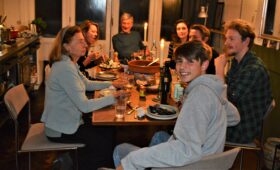
L.R. My sister Karolien van Ommen, niece Mariken de Ruiter (hostess) nephew Dirk Jan de Ruiter, grand niece Phoebe Ohayon, grand nephews Daan de Ruiter, and front Lukas de Ruiter, Phoebe’s boyfriend Maikel.
On the Saturday October 5th I attended the centennial celebration of the “De Schinkel” yacht club in Amsterdam, where I had been a guest between August 2009 and September 2013, and joined the club in the last year I was there. My uncle Fred van Ommen, taught me my first sailing lessons at this club in the late forties. Frankly this was a bit of a disappointment compared to the 90th anniversary when I was there on “Fleetwood”. At that time there was wide participation in the program by the members and I got to lead sing one Dutch sea shanty with the Amsterdam Harbor Choir. This time it was in the confinements of the club house and a huge band made conversations very difficult. But I still managed to reacquaint with a good number of my friends from the 2009-2014 period.
So far, no one here in Cape Charles has remarked that they wished that I would have stayed away longer than the six weeks. I just heard that the Messiah choir and sing along for December 10 has been cancelled here. I will sing in: “The Gift of the Magi” musical adaption. Being performed on November 22, 23 and 24 in the old Palace Theater on main street in Cape Charles, Va. I shall fly on the 25th to Sea-Tac for Thanksgiving with my west coast family at Lisa’s home. I will use a standby buddy pass and will have to wait until the air has cleared after the mass exit from the holiday, for space availability. I figure on setting sail for the Caribbean by mid December.
Next week, Thursday the 24th, I plan sail to the Matthews Yacht Club for the annual fall dinner of the local chapter of the Ocean Cruising Club. There will most likely be a number of members from the N.E. Atlantic who are gathering here for the official end of the hurricane season to sail to the Caribbean in the Salty Dawg rally or individually.

